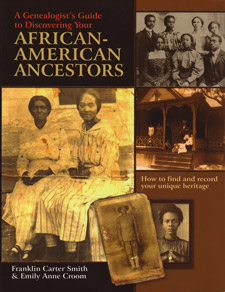Title: A Genealogist’s Guide to Discovering Your African-American Ancestors
Authors: Franklin Carter Smith & Emily Anne Croon
Published: 2003
Type: soft cover
Size: 8½ x 11
Pages: 250
ISBN: 9780806317885
FRP Item #: GPC5455
 A Genealogist’s Guide to Discovering Your African-American Ancestors reads like many other family history primers. The book outlines basic research principles, where to find and how to use common documents, census records, etc. However, the book is unique in application. Using examples, illustrations, and a number of case studies, this book directly targets the areas most difficult in researching African-American genealogy.
A Genealogist’s Guide to Discovering Your African-American Ancestors reads like many other family history primers. The book outlines basic research principles, where to find and how to use common documents, census records, etc. However, the book is unique in application. Using examples, illustrations, and a number of case studies, this book directly targets the areas most difficult in researching African-American genealogy.
This guide includes methods for successfully researching slavery-era records. The book also suggests ways to help identify an individual’s slaveholder and slaveholding families. Some highlighted areas include using African-American specific resources like the Freedmen’s Bureau and Freedman’s Bank records. One area I am glad to see addressed is the importance given to gathering and preserving a family’s oral and social history; something, all genealogist could spend more time collecting.
Whether you are new to family history or you are an experienced genealogist, if you have African-American roots, then this book may just help you get past some of your toughest research stumbling blocks.
Table of Contents
Forward
1 In the Beginning
Basic Principles of Genealogy – Two Basic Charts – Tips for Success – Creating a Knowledge Base – Consult the Elders – Family Gatherings, Reunions, and Funerals
2 Census Records
About Census Records – Where to Find Census Records – Using Census Records – Indexes and Soundex – A Case Study: The Search for Ancestors of Elizabeth “Lizzie” (Blount) Armstead
3 Federal Sources
Social Security Records – Military Records – Bureau of Refugees, Freedmen, and Abandoned Lands – Freedman’s Savings and Trust Company – Federal Land Records – NUCMC – Southern Claims Commission
4 State, County, and Local Sources
State Records – County Records – Local Records – Combining Records: The Case of William Collins – Research Guides to the States
5 Special Situations
“Free Negroes” Before the Civil War – Manumission Records – Free Black Registers – Census Records – Guardianship Records – Tax Rolls – State Records – Land Records – Urban Free Blacks Before 1865 – Native American Connections – Immigrants – For Further Reading: Free Persons of Color Before 1865
6 What’s in a Name?
Given Names – Surnames – A Case Study: One Crossley Family – The Next Steps
7 Location, Location, Location
1870 Families in the North or West – 1870 Families in the South – 1860 Census Schedules – Using Land Records – Miscellaneous Records – On Location: A Study of Thomas Bowen
8 The Other Family
Studying the Slaveholder Candidate – The Other Family: A Family Profile – Case Study: Caldonia (Short) Hilson
9 The Search for Ancestors in Slaveholder Documents
The Slave as Chattel Property – The Records – Land and Public Domain Records – Deeds and Property Records – Estate Documents – Court Records – Business and Personal Records – Other Resources
10 Case Study: The Issue of Mixed Race
The Search for Henry Dotson – The Post-Civil War Search – The Pre-Civil War Search – William Dotson, The Slaveholder – William Dotson, The Father
11 Case Study: A Story of Triumph and Tragedy
The First Steps: Tracking Back to 1870 – The Search for a Cluster in 1870 – The Search for the Slaveholder – Focus on Pre-Civil War Documents – Epilogue
12 Case Study: All in the Neighborhood
Post-Civil War Research: Identifying Archie’s Family – The 1870 Community – Pre-Civil War Research: Identifying the Slaveholder(s) – A Candidate Family to Study – The Parent Generation
Appendix A Free and Slaveholding States and Territories in 1861
Appendix B Federal Census, 1790–1930
Appendix C State Archives
Appendix D National Archives and Regional Branches
Appendix E Blank Forms
Endnotes
Bibliography
Index
Order your copy of A Genealogist’s Guide to Discovering Your African-American Ancestors by John and Sheila Rowlands; Item #GPC5455